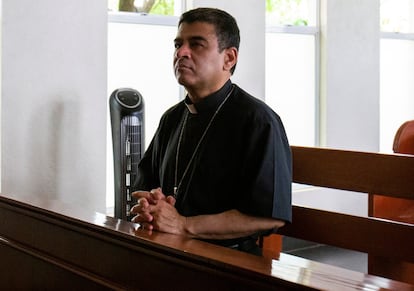Rolando Álvarez: Human rights groups ask for ‘proof of life’ of Nicaraguan bishop who refused exile
According to President Daniel Ortega, the dissident prelate is being held in La Modelo prison but he has received no visitors and his lawyer has accused the regime of his ‘forced disappearance’


The last time Rolando Álvarez was seen in public was 72 days ago, on January 10, the day on which the regime of Daniel Ortega and Rosario Murillo tried the bishop of Matagalpa for the alleged crimes of “conspiracy to undermine national integrity” and the “spreading of false news.” The religious leader, one of the most critical voices from within the Catholic Church against the Sandinista regime, looked pale and thinner than usual, but serene during his appearance in the 10th Criminal District Court of Managua. The rest of the political trial, for which he was sentenced to 26 years in prison, was held behind closed doors.
The guilty verdict was read to the bishop the day after Ortega and Murillo ordered the release 222 political prisoners, stripping them of their nationality and placing them on a flight to the United States. Álvarez refused to board the plane and, according to political analysts, thus ruined the presidential couple’s attempt to placate the international community’s demand that Nicaragua’s political prisoners be freed. Ortega unleashed a tirade against the prelate, accusing him of “arrogance” and being “out of his mind.”
“But in any case, that will have to be solved now by the judicial authorities, who of course are well informed about this man’s case, and by the medical authorities who will have to take care of him, because now that he has arrived at the Modelo prison, he has started behaving like a madman,” said Ortega, who together with his wife, the country’s vice-president, has been accused by UN experts of committing crimes against humanity.
Álvarez has been under house arrest since August 2022 but has now been transferred to the country’s notorious penal system, where he has been denied any visitors including his family. Lawyer Yader Morazán, who was also stripped of his Nicaraguan nationality by Ortega’s government, explained that the fact that not even those closest to him have been able to see Álvarez, despite his location being revealed by Ortega on national television, constitutes a case of “forced disappearance” under Article 7 of the International Criminal Court’s Rome Statute.
Lawyers and human rights groups demand Álvarez’s release
The Blue and White National Unity (UNAB), an opposition organization founded in 2018, has demanded from the regime “proof of life” of Bishop Álvarez, who the group says was “unjustly kidnapped for raising his voice in the face of so much evil.” The Nicaraguan Center for Human Rights also called for the release of Álvarez, the first Nicaraguan bishop to be arrested and condemned by the Ortega-Murillo regime amid a religious persecution against the Catholic Church. “The life of Monsignor Rolando Álvarez is in danger, his physical and psychological condition is unknown,” the organization stated.
From exile in Miami, the auxiliary bishop of Managua, Monsignor Silvio Báez, prayed that the “imprisoned bishop” would not be forgotten. “He is a just man, an innocent pastor who has ignited their fury because they cannot tolerate his words,” he said on March 19. Pope Francis has also spoken of the incarceration of Bishop Álvarez, expressing his “sadness and concern” over the prelate. The Sandinista regime subsequently “suspended” diplomatic relations with the Vatican. Four days ago, the chargé d’affaires of the Holy See in Managua, Marcel Diouf, left Nicaragua and closed the nunciature.
On March 18, Mexican lawyer Carlos Ramírez of the Christian Lawyers Foundation, told La Prensa that the organization would petition for the case of Álvarez in the international institutions, describing his trial as being plagued “by a series of irregularities, in a clear violation of his constitutional guarantees and human rights.”
Ramírez said the foundation would seek the intervention of the Organization of American States, the U.N., and the Inter-American Court of Human Rights once all local judicial avenues had been exhausted “to safeguard the human rights of the politically persecuted or of prisoners whose rights have been violated.”
Sign up for our weekly newsletter to get more English-language news coverage from EL PAÍS USA Edition
Tu suscripción se está usando en otro dispositivo
¿Quieres añadir otro usuario a tu suscripción?
Si continúas leyendo en este dispositivo, no se podrá leer en el otro.
FlechaTu suscripción se está usando en otro dispositivo y solo puedes acceder a EL PAÍS desde un dispositivo a la vez.
Si quieres compartir tu cuenta, cambia tu suscripción a la modalidad Premium, así podrás añadir otro usuario. Cada uno accederá con su propia cuenta de email, lo que os permitirá personalizar vuestra experiencia en EL PAÍS.
¿Tienes una suscripción de empresa? Accede aquí para contratar más cuentas.
En el caso de no saber quién está usando tu cuenta, te recomendamos cambiar tu contraseña aquí.
Si decides continuar compartiendo tu cuenta, este mensaje se mostrará en tu dispositivo y en el de la otra persona que está usando tu cuenta de forma indefinida, afectando a tu experiencia de lectura. Puedes consultar aquí los términos y condiciones de la suscripción digital.








































